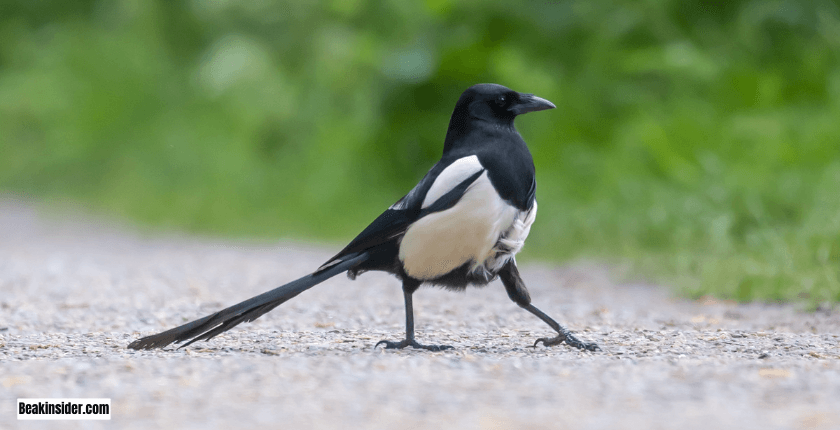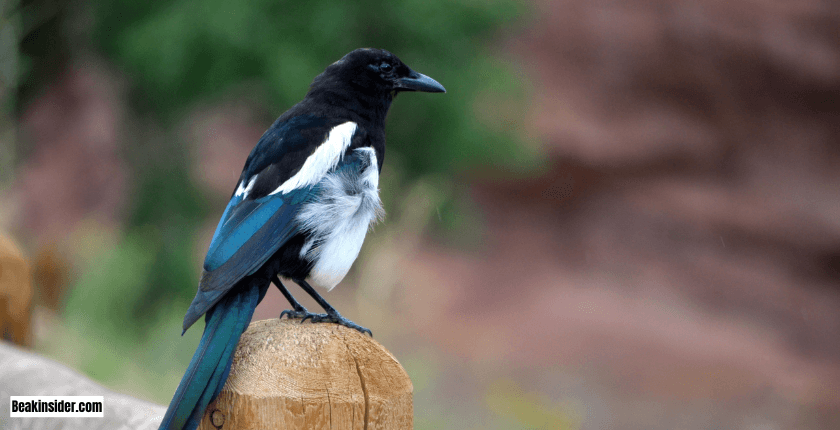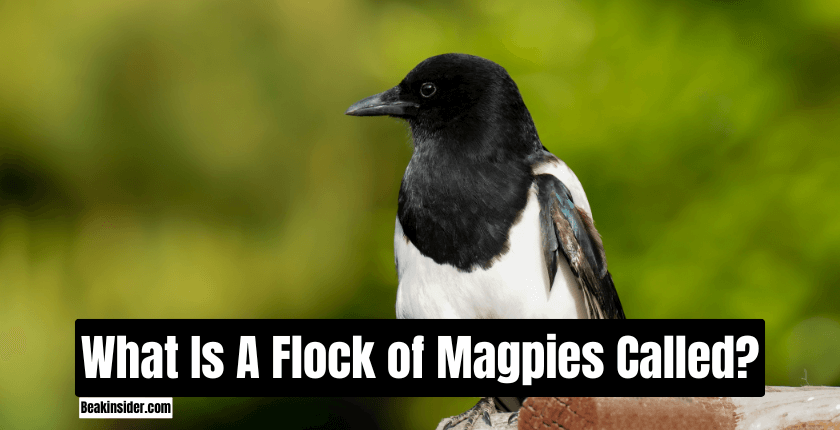The magpies’ flock is called “Murder” and “Conspiracy” due to various myths and folklore. They are seen as a symbol of bad and good luck. Different flock of magpies have their own representation with specific meaning.
They always prefer to live in small and medium flocks. They are known for having an inquisitive nature. They have striking black and white colored feathers. In this article, I will tell you:
- Names of Magpies’ flock
- Origin of common terms used for magpies’ flock,
- Flock behavior of magpies,
- Flock behavior during breeding season,
- How to observe magpies flock?
Let’s start without wasting time!
Name of Magpies’ Flock
There are different names that we use for the group of magpies, but the most common are Murder and Conspiracy. Different peoples use different terms to tell the grouping of magpies like charm, tiding and gulp. There are specific cultural beliefs beyond the terminologies used for magpies. These above mentioned names show specific behavior of magpies.
Common Terms Used for Flock of Magpies
- A Murder of Magpies: This term is mostly used to show mysteries, superstitions etc. This term has been derived from group name of crows.
- A Conspiracy of Magpies: This term shows that magpies are clever. It reflects their mischievous nature like conspiring plotting etc.
- A Tiding of Magpies: The tiding of magpies is a poetic term that shows the association of magpies with symbols of nature like tidings.
- A Charm of Magpies: Magpies have a very attractive and appealing appearance. This term is mostly used to show their beautiful appearance especially, when they are gathered in groups.
Why Are They Named As Conspiracy or Murder?

Magpies are named as “Conspiracy” and “Murder” due to historical reasons. These names show that magpies are intelligent birds that have an association with superstition. Like other birds, including ravens, crows etc, magpies are part of folklore and are represented as symbol of magic, mischief, mysteries etc.
Origin of Terms
- Mystery and Mischief: Magpies are famous for their curious and mischievous nature. They always explore near objects with a cunning sense. Due to this behavior, people saw them as conspiratorial.
- Folklore and Superstition: In Europe, magpies are the symbol of bad and good luck. They have a striking appearance that enables them to seem “Otherworldly”.
- Similarities with Crows and Ravens: Magpies are members of the Corvid family. They are similar to the ravens, crows etc. They are seen as symbol of death and mystery. This association led to terminologies of “Murder” and “Conspiracy” for magpies.
Flock Behavior of Magpies

Magpies are social birds. They remain social throughout the year, except for breeding season. They live in groups to roost, socialize, forage etc. They like medium and small flocks. You often see a pair of magpies during the breeding season. The grouping and social nature of magpies are vital for their bonding and survival.
- Foraging and Food Sharing: Magpies always forage with their fellow species and share information about different food spots. Through groups, they can easily access various food spots and find them accurately and efficiently.
- Roosting Together: The grouping of magpies has one important function which is to roost in trees and other areas that are safe and hot during the winter season.
- Social Bonding: Within flocks, they made social interaction that led to establishment of hierarchies. They develop relationships and perform various social skills.
- Warning Signals: Magpies have few vocalization skills which they can use to alert other fellow species in a group. Their vocalization shows their community nature. It also shows that they are highly social.
Do Magpies Live in Flocks?
Yes, magpies live in flocks. But, they always prefer to live in medium-sized flocks. They live with their pair during the breeding season to help their females in raising their youngsters. A pair of magpies are efficient in territorial defense, protecting their checks from predators, chasing potential threats etc. When their breeding season ends, they come back to their flock dynamics.
Flock Behavior During Different Seasons
- Breeding Season (Spring and Summer): During the breeding season that starts in spring and ends in summer, you can see magpies in pairs. During this period, they are territorial and exhibit aggression for the protection of their nests.
- Autumn and Winter: When the breathing season ends, usually in winter and autumn seasons, magpies return to their flocks for foraging, protection, socialization etc.
Myths of Magpies’ Flocks
Magpies are always featured in different myths and legends across different cultures. They have symbolic meanings associated with their grouping. In different cultures, groups of magpies are seen as the symbol of death. Every name represents a specific symbol and has its meaning.
Symbolic Meanings for Names of Magpies’ Group:
- Good Luck or Bad Luck: In different cultures, a magpie is seen as a symbol of bad luck. But, if they saw a group of magpies, then it is a symbol of good luck.
- Omen of Tidings: In some cultures, magpies are named as tidings that represent that they bring news either good or bad.
- Symbol of Curiosity: Magpies are loved for their inquisitive nature. Their inquisitive nature makes them a symbol of mystery and curiosity.
Unique Names
Like magpies, different birds have interesting and attractive names showing their particular characteristics, behavior and skills. Some names are from ancient folklore while others are from recent tradition.
Examples of Birds’ Group Names:
Here I will tell you some examples of names of bird groups.
- A Murder of Crows: Crows has also named “Murder of the crows” due to their intelligence and association with mysteries and folklore.
- An Exaltation of Larks: It is a poetic term showing the beautiful voice of larks.
- A Parliament of Owls: The term parliament of owls shows their wisdom.
- A Gaggle of Geese: Their name shows their noisy behavior and thus leads to the term “Gaggle”.
How to Observe Magpies’ Flock?

This is a frequently asked question. If you want to observe the flocks of magpies to know their fascinating and attractive social behavior, you should keep things in mind for a positive experience.
Useful Tips
- Maintain a Safe Distance: Magpies are protective birds. If their nesting season starts, then it is better to observe them from a long distance and if you go near them, then don’t disturb them.
- Observe Outside Breeding Season: It is better to observe the behavior of magpies in autumn and winter. During this period, they are less territorial and are found in large groups.
Conclusion
The flock name “Murder” and “Conspiracy” show how human beings think about the clever and complex behavior of this striking white and black bird. They are famous for their social nature. They forage together as well as communicate with each other to alert them. The flock name of magpies reflect particular aspect of their behavior, sometimes showing a mysterious side and sometimes their charming and attractive nature.
If you have any queries regarding the content, text me in the comment box, I will reply to you soon.
Thanks for reading!
Related Articles |
- How To Remove Bird Poop From Your Car’s Paint?
- 12 Amazing Facts about Bald Eagles! – A Symbolic Representation!
- How to Take Care Of A Baby Bird That Fell Out Of Its Nest? – Easy Guide!
- Importance of Parrots Sleep: Is Your Parrot Getting Enough Sleep?
- How Much Sleep Does A Parrot Need? – Interesting Fact!

I’m Amna, and I absolutely adore birds, especially parrots. I’ve been immersed in the world of these colorful feathered friends for over 10 years. While I’m not a bird doctor, I’ve gathered a wealth of knowledge on how to care for and understand them.
My experiences extend to various bird species like parrots, macaws, cockatoos, canaries, and finches. In addition to my personal adventures with birds, I’ve dedicated time to volunteering at a local bird rehabilitation center.
My true passion lies in sharing what I know about parrots and birds with you. Through my articles, I aim to share the information you need to provide the very best care for your avian companions. So, let’s embark on this journey together and make your feathered friends’ lives as joyful and healthy as possible!

